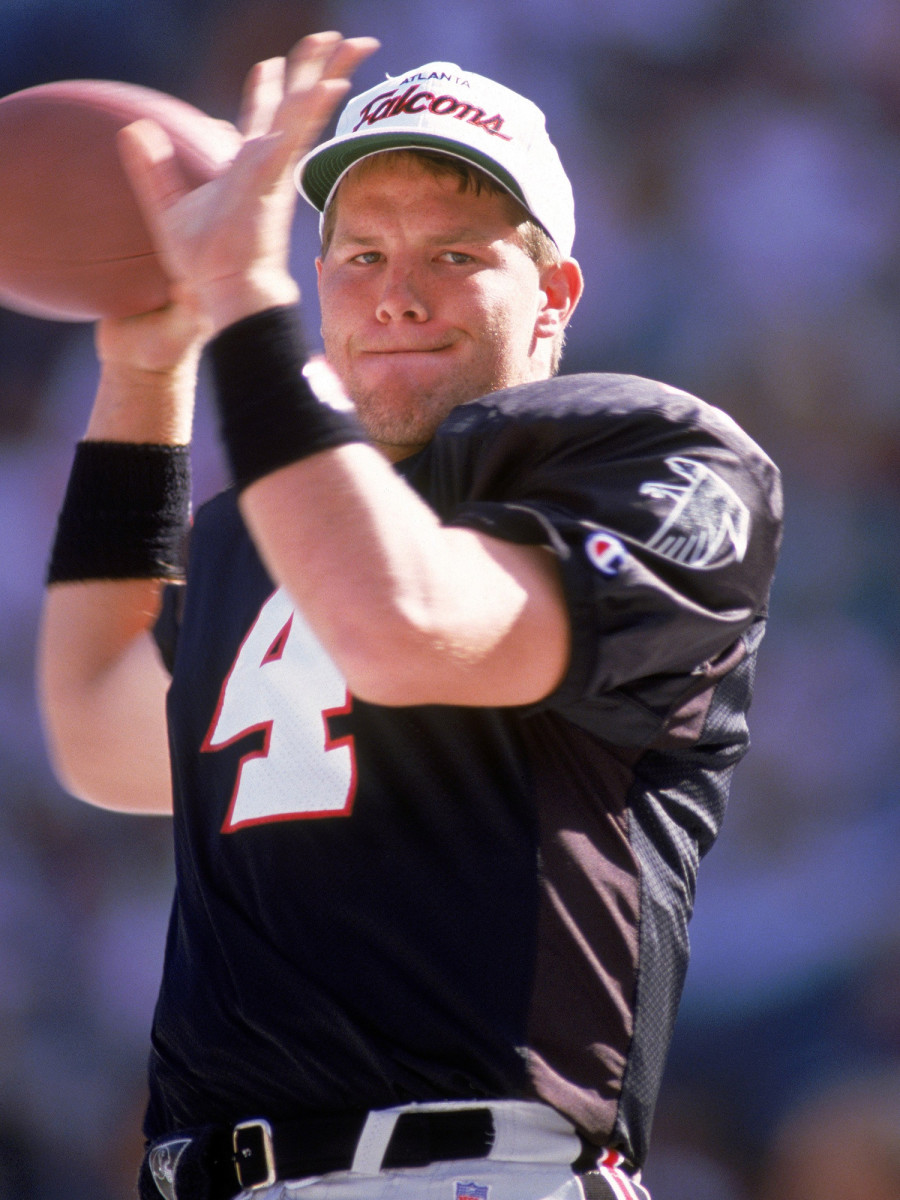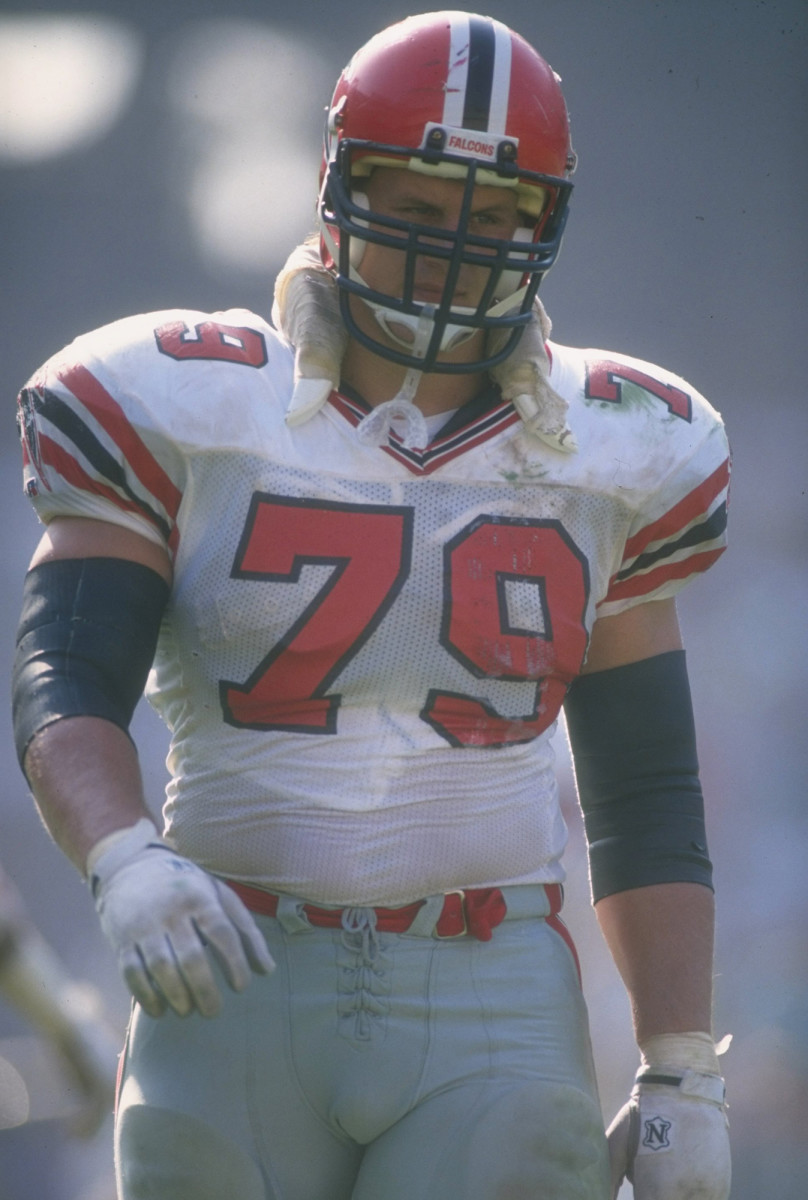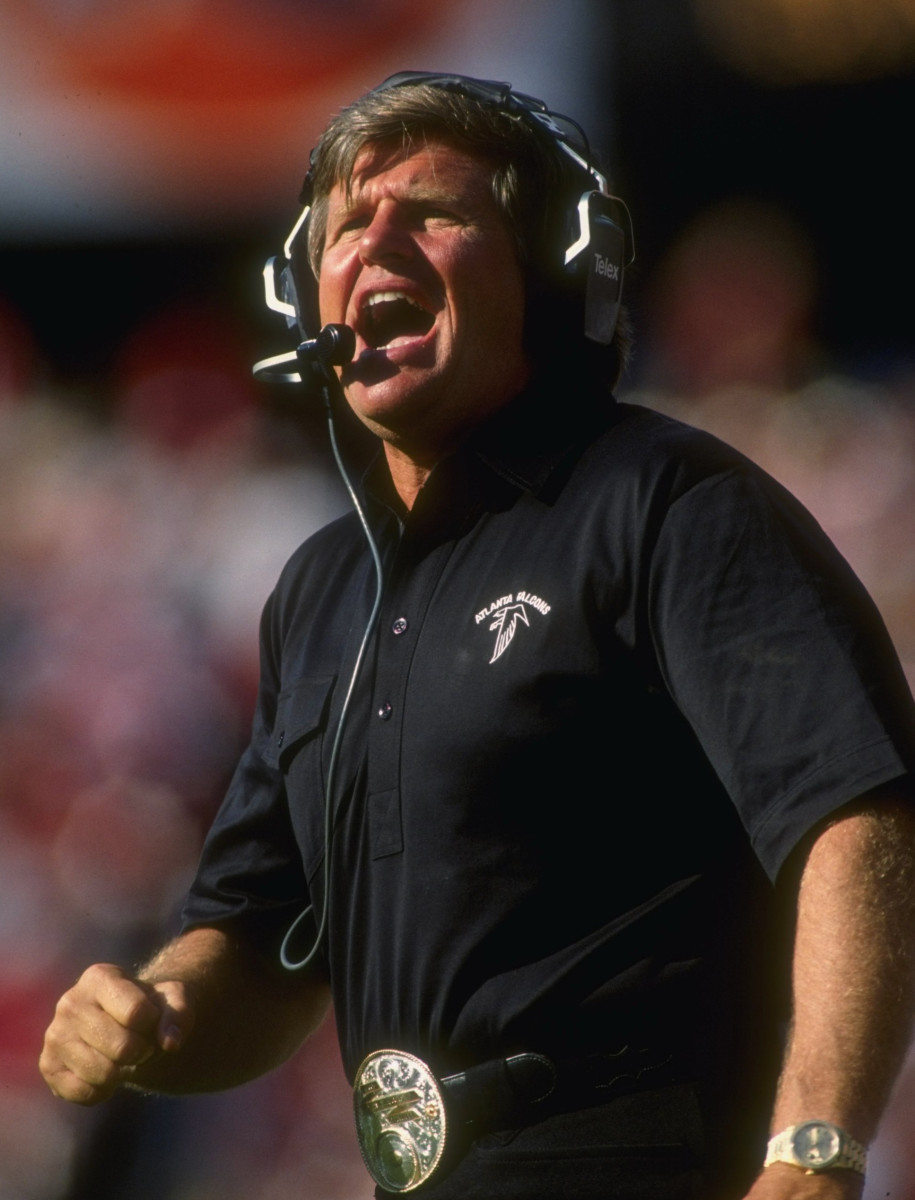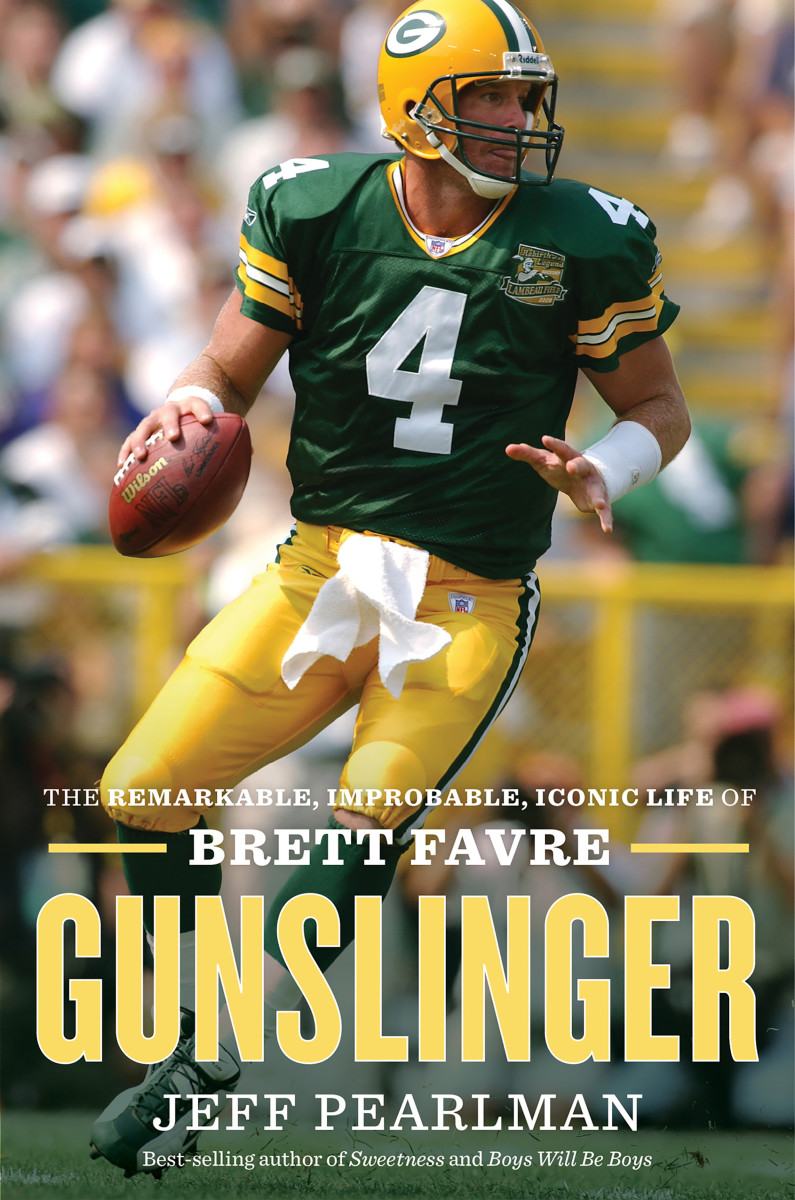Reckless rookie: Inside Brett Favre's strange season with the misfit Atlanta Falcons

The following is excerpted from Gunslinger: The Remarkable, Improbable, Iconic Life of Brett Favre by Jeff Pearlman. Copyright © 2016 by Jeff Pearlman. Used by permission of Houghton Mifflin Harcourt. All rights reserved.
Traditionally speaking, the days that follow the draft serve as a period of mental adjustment. Young players come to grips with relocating to foreign cities, and organizations start the process of figuring out who fits where, and how. There are press conferences to attend and papers to sign and jerseys to hoist and pose behind. Although Falcons coach Jerry Glanville was far from enamored with the addition of a quarterback he didn’t want in the spring of 1991, he had no choice in the matter. Brett Favre was coming to Atlanta.
Before bread could be broken, though, Bus Cook—Favre’s naive agent—committed a classic rookie mistake. Having watched his client’s heartbreak over being a second-round pick, and also seeing Raghib Ismail, the presumptive first overall selection in the draft, take big money from the Canadian Football League, Cook reached out to the Toronto Argonauts and the Winnipeg Blue Bombers. Then he informed the media. “That Canada stuff, it’s just us talking right now,” Cook told TheAtlanta Journal-Constitution on April 23. “Brett wants badly to play in Atlanta, but we have to explore all the options.”
The resulting freeze between player and franchise involved Glanville uttering the phrase “F--- that kid” inside the Atlanta offices 2,762,211 times. During his stretch not under contract, Favre remained home in Kiln, kicking back in his childhood bedroom, casually throwing the football around with friends and watching New Jack City, his all-time favorite movie, on a near-endless loop. At long last, on July 17, Favre and the Falcons agreed to a three-year, $1.4 million deal that included a signing bonus somewhere between $350,000 and $400,000. He placed 70% of the money in stocks and bonds, and used the rest to purchase a $30,000 maroon Acura. Favre reported to Suwanee, Ga., the next day for the opening of training camp, commencing his one-year apprenticeship at the strangest and most dysfunctional shop in the National Football League.

Gunslinger
by Jeff Pearlman
More than 500 interviews tell the story of Brett Favre and his remarkable, improbable, iconic life.
Beginning with the Falcons’ debut season in 1966, the team forged a reputation for spirited ineptitude. The franchise was owned by Rankin Smith, a former U.S. Army combat pilot who made his money in his family’s life insurance business, and run by Taylor Smith, the fourth of his five children. “In public they were called the Clampetts,” says Terence Moore, a longtime sports columnist for the Journal-Constitution. “They were nice people who couldn’t figure it out.” Upon Favre’s arrival Atlanta had but one double-digit-win season, but some around the league felt the team was turning a corner. The roster featured a slew of young, exciting players, including quarterback Chris Miller, receiver Andre Rison and a dynamic defensive back from Florida State named Deion Sanders. And while Atlanta finished 5–11 in 1990, fans seemed to believe in the vision of the coach. Glanville was loved by a few in the NFL and abhorred by the majority. Sometimes he told the truth. Oftentimes he stretched it. “You can listen to 100% of what Jerry said,” says then team president Taylor Smith, “and believe 30% of it.”
At his previous job, in Houston, Glanville had called himself “the dark prince” and issued a challenge to his players—break 100 facemasks per season. He spoke of developing “trained killers.” His Oilers were a dirty team that specialized in late hits and illegal shots. Were Glanville unhappy with a player, he’d let him know. When a defensive lineman held out for more money, Glanville ripped the nameplate from above his locker and stuck it over the entranceway to the bathroom. Glanville dressed in all black, drove Harley-Davidsons, listened to rock ’n’ roll and left tickets at the front gate for Elvis and James Dean. But by the time Houston lost to the Steelers in the first round of the 1989 playoffs, the Oilers’ front office had tired of his antics.
The Falcons swooped Glanville up. In his introductory press conference, he was asked about the terms of his contract. He had no idea. The uniform and helmet colors went from primarily red to primarily black. He encouraged Rison and Sanders to dance. “He was the ultimate players’ coach in many ways,” says Ken Herock, then Atlanta’s VP of player personnel. “He bulls---s with the players, he has fun with the players. But if he didn’t like you, or he didn’t want you around, it was a different thing entirely.”
From the day he checked into camp, Favre was an object of Glanville’s derision. Their opening exchange said it all.

Glanville: “Hey, Mississippi!”
Favre: “Hey, Coach, how are you doing?”
Glanville: “Call me Jerry.”
Favre: “O.K. Hey, Jerry.”
Glanville: “What school are you from, Mississippi?”
Favre: “Southern Miss.”
Glanville: “Aw, damn, we drafted the wrong guy. We wanted the guy from Mississippi State.”
“I was standing next to Brett,” says George Koonce, a rookie free-agent linebacker, “and I remember the look on his face was devastation.”
To Glanville, Favre projected an unjustified cockiness. The coach liked bravado, only not from rookies. There were other quarterbacks in camp—Miller, the established starter; Scott Campbell, a veteran backup; Gilbert Renfroe, a CFL refugee; Mike Rhodes, a former Arena League star—and Favre made it clear he thought he was the best of the bunch. “I’d played in six Pro Bowls by that point, and this kid comes up to me in camp and tells me he has the strongest arm in the NFL,” says Chris Hinton, an offensive lineman. “I’m like, ‘Yeah, whatever.’”
“Every week, if I was there on Friday, Brett would find me and start bitching,” says Herock. “He would always say, ‘Mr. Herock, I’m better than the guys you have here. I’m better.’”
When Herock responded that Miller was the established starter, Favre snapped, “I’m better than him!”
For the first two weeks of camp, Favre could not throw a spiral. He would drop back, release, and—wobble, wobble. A man known for his fastball was suddenly Phil Niekro. He chalked it up to nervousness. Then a lack of reps. When seven-on-seven drills commenced after a few days, June Jones, the Falcons’ offensive coordinator, increased Favre’s reps. He hoped more passes would equal more comfort. “Throwing a football’s something I never had to think about,” Favre said at the time. “But, man, there’s some ugly ones, aren’t there?”
Glanville ran the NFL’s least-disciplined training camp, as well as the most colorful. No team featured more beer drinkers, more trash talkers, more larger-than-life personalities. Sanders, brash and outspoken, bought Favre his first dressy outfits, two garish suits straight out of Pimp 101. Rison purchased luxury cars as if he were buying cups of coffee.
There was also a dark side on the team. His name was Bill Fralic.
A 1985 first-round draft pick out of Pittsburgh, Fralic was a four-time Pro Bowler and one of the locker room’s more sadistic ringleaders. If his No.1 goal was to win games, it often felt as if a close second was teaming with his fellow offensive linemen to make life miserable for young Falcons. Sympathetic veterans warned rookies to steer clear, and with good reason. The linemen lived to humiliate.
In 1990, for example, members of the unit grabbed a young player as he was showering, taped his arms to a metal bench and carried both (the man and the bench) onto the field. “He’s out there naked, in front of people, and he can’t move,” says one Falcon. “The fans watched it all."

Favre’s draft class included a 10th-round pick named Pete Lucas. A 6'3", 320-pound tackle, Lucas had graduated from high school and spent several years working at Swaggart Furniture, a Wisconsin-based family business. When his grandfather sold the company, Lucas enrolled at Wisconsin–Stevens Point and became a Football Gazette All-America. By the time he was picked by the Falcons, he was 25 and unusually mature for a rookie.
Fralic and several of his linemates made Lucas the target of their aggressions. “I was threatened to have my knees taken out in practice if I didn’t do as I was told,” Lucas says. “And that was basically to take my clothes off, sing, dance, perform—naked, any time, any place. I don’t know if it was because I intimidated them with my size and strength, but it happened to me all the time. On airplanes, on buses. You expect some hazing from time to time. But when the coaches stop meetings so guys can force you to strip and do something, it’s a different level. In offensive-line meetings the coach would call for a break and I’d take my clothes off.” (Fralic declined comment.)
One awful night Lucas and another rookie lineman, Mark Tucker, out of Southern Cal, were commanded to strip naked in front of the entire offensive line, hold each other tight and sing “Ebony and Ivory,” the Stevie Wonder–Paul McCartney ode to racial unity. Lucas is white, Tucker African-American. “It was always the same thing: ‘Do this or your knees are taken out,’” says Lucas. “There were times I’d be on an airplane sleeping, and I’d get knocked in the head and told, ‘Guess what? It’s time to get naked.’ I felt sexually violated and humiliated. There was one night where they made all the rookies get up and do a song and dance. I drank as much as I could beforehand, because I was told, ‘I better see nuts hanging out, or your knees are gone.'"
Lucas’s accounts are confirmed by other Falcons players. Bob Christian, a rookie fullback who roomed with Lucas and went on to a 10-year NFL career, calls that offensive line “perverted” and says members of the unit threatened to shave off his pubic hair if he didn’t sit for a veteran-administered haircut. “Pete is not lying,” says Christian. “Something was really wrong with them.” Says Tucker: “I hate that he was so scarred.”
The Falcons eventually released Lucas, ending his NFL career before it ever began. “It was,” he says, “the greatest relief of my life.”
Not yet 22 and naive to the world, Favre was in no position to step in and help a battered teammate. Not that he would have. Much like when he arrived at Southern Miss out of high school, the offensive linemen (and Fralic in particular) took a liking to Favre. He was one of them—a drinker, an airplane poker player. His shower routine involved bending over, naked, and pretending to chat with his butt crack. “It sounds gross,” said Scott Fulhage, the punter, “but it was hilarious.” As other rookies had their hair cut into mortifying clumps and unimaginable angles, Favre bribed his way out of the same fate. “He came and asked us whether he could avoid a Mohawk in exchange for a dinner for all the linemen,” says Hinton. “We went for it.” Favre took the entire unit to Bone’s, a steak house on Piedmont Road in Atlanta. It cost him a couple of thousand dollars, but his shaggy brown hair went untouched. “He ordered fish and drowned it in ketchup,” says Hinton.
Even though he didn’t want Favre, Glanville knew he had to keep him. After a couple of bad weeks of camp, the quarterback started to find his groove. Miller’s arm strength was terrific, but Favre’s throws were events. As was the case in college, his power left many a training camp wide receiver wounded. “He didn’t make many right reads,” said Naz Worthen, a free agent receiver. “But, boy, he could sting your fingers.”

Favre presumed he would wind up the No. 2 quarterback. Sure, he struggled to grasp Jones’s complex red-gun offense, but things were starting to make sense. The Falcons’ 1991 regular season was scheduled to open at Kansas City on Sept.1, and Favre told family and friends that barring an alien invasion, he would be playing behind Miller.
On Aug. 28, the aliens invaded.
The headline on the Associated Press story read CHARGERS TOLLIVER TRADED TO FALCONS, but it could have been FALCONS' FAVRE NOW FREE TO GET FAT AND DRUNK. A third-year quarterback out of Texas Tech, Billy Joe Tolliver had been nicknamed Billy Joe Terrible by Brian Hewitt of the Los Angeles Times, and it was justified. He was just good enough to play and just bad enough to lose. Herock made the trade with San Diego with the understanding that Favre would remain the first backup. Then Herock read the depth chart for the second-week battle against Minnesota and saw that Glanville listed Tolliver as the top reserve. He barged into Glanville’s office. “I thought we agreed Brett was No. 2 and Billy Joe would be third,” Herock said. “That’s the reason I made the trade.”
Glanville didn’t like Herock and he didn’t like Favre. He also had final say on lineups. “Well, BillyJoe just knows so much more than Brett,” he crowed. “He’s more ready to play.”
At that moment, the Herock-Glanville relationship—never terrific to begin with—was permanently damaged. “I never really trusted him,” Herock says. “He lied a lot.”
When Favre learned of Tolliver’s acquisition, he was indifferent. Quarterbacks come, quarterbacks go. It was only after the Minnesota game—when Miller, Tolliver and Favre all suited up—that he realized his plight. Under a new NFL rule, a team could dress a third quarterback and still designate him as inactive and only available in case of injury to the starter and backup. Nobody bothered to fill Favre in. He learned that he had been deactivated only when Journal-Constitution beat writer Len Pasquarelli approached him in the locker room to ask whether he was upset. “I was third?” Favre said. An awkward pause. “Oh, well. I’ll just keep plugging away, I guess.”
“It was the beginning of the end,” says Herock. “Brett lost interest.”
There are good teams for young players and bad teams for young players, and the ’91 Falcons were the all-time worst. Although Glanville’s squad wound up compiling a 10–6 record en route to a rare playoff berth, everything seemed to be about brashness and arrogance and individual liberties. Glanville regularly invited celebrities to stand along the sideline during games, and granted rapper MC Hammer carte blanche to the team facilities. One of Glanville’s favorite quotes—“If you ain’t cheatin’, you ain’t tryin’”—was interpreted literally by a roster filled with cheap-shot artists. Glanville continued to humiliate his rookie quarterback in ways big and small. When the team traveled, Glanville kept warmups loose by betting any takers that Favre could launch a football into a stadium’s highest decks. Favre always succeeded, but did not enjoy being part of the dog and pony show.

Scott Favre, Brett’s sibling and college running buddy, moved to Atlanta to keep his kid brother company. He took a job teaching learning-disabled middle-schoolers in the Clayton County School District, and Brett and Scott rented an apartment. Two of their friends attended a nearby chiropractic college, and the four hit the city hard. Brett knew he wouldn’t play on Sundays, so he went on a nonstop drinking and eating binge. Lots of pineapple and vodka, lots of pizza and steak and doughnuts. “He didn’t think he’d ever get a chance that season, so he probably didn’t take it very seriously,” said Scott. “Plus, you’re young and dumb and in a big, exciting city. We took advantage of it.”
“I just said, ‘The hell with it,’” said Brett. “I went out every night, gained weight and was out of shape. I didn’t study, I didn’t care. I’d show up just in time for the meetings, and I’d be out of there the second the meetings were over.”
Glanville reached out to the Falcons’ favorite night spots. “I went to downtown Atlanta, to a place called Frankie’s, to a bunch of other spots. I went to all of them and asked them not to give [Favre] free drinks, not to let him party, that he needed to be at home,” Glanville says. “Well, in Atlanta they don’t care who you are, what you want. No bar would agree to help me.
“People think I didn’t like Brett Favre. Not true. It wasn’t about like or hate. I saw him do things with a football nobody did. I’ve seen him, in the wind, throw strikes when nobody could get heat on the ball. He could play. But he didn’t want to play. He wanted to party.”
Favre’s regular-season debut came on Oct. 27, against the Rams at Atlanta-Fulton County Stadium. Miller had left the game with a bruised right thigh, and Tolliver went 5 for 5 for 45 yards before a hip pointer forced him out too. With 1:54 remaining in the fourth quarter, his team up 31–14, Brett Favre walked onto the field under Glanville’s directive: “Don’t do anything stupid, Mississippi.” Favre successfully handed off three times. “Hey, I came in and ran out the clock pretty good, didn’t I?” he joked afterward. “I think I found me a new role. I’ll be our kill-the-clock guy.”
At one o'clock on the afternoon of Nov. 10, 1991, two weeks after Favre executed those three marvelous handoffs, the Falcons and the Redskins faced off in Washington. At 9–0, the Redskins were an NFL powerhouse. At 5–4, the Falcons were on the rise and confident. With Miller out because of a rib injury, Tolliver started and completed 14 of 31 passes. By late in the fourth quarter the Redskins were up 49–17 and the 56,454 fans at RFK Stadium were filing out.
A few weeks earlier Glanville had said that for Favre to play, “We gotta have two plane wrecks and four quarterbacks go down.” This was neither an airline crash nor four battered quarterbacks, but Tolliver had been sacked five times. So, with nowhere else to turn, Glanville let Favre take over for the final 55 seconds. Wearing his black number 4 jersey over a white long-sleeve shirt (it was 35º), Favre trotted onto the muddy green field, approached the line, ducked behind center, and—for reasons only he probably knows—grinned boyishly. Perhaps it had to do with the realization of a lifelong dream. More likely, it was the preposterousness of an oddball rookie season. The PA announcer, Charlie Brotman, blared, “In at quarterback, Brett Favre!” Steam rose from the rookie’s breath as he barked the signals. Two wide receivers stood to the right, two to the far left. Rison jogged in motion behind him, the lackluster trot of a man itching for a hot shower.
Favre took the snap and dropped nine steps back. With the pocket collapsing, the quarterback drew back his arm and shot a pass—high and hard but not completely uncatchable—toward wide receiver Mike Pritchard. The football slipped through the wide receiver’s hands and into the arms of linebacker Andre Collins, playing four yards back. He bobbled the ball, controlled it, and sprinted 15 yards for the score. Favre walked off the field. “Well, Brett Favre, you ever have the Redskins on your schedule at Southern Mississippi?” crowed Randy Cross, a former NFL star now working color commentary for CBS. “Welcome to RFK and the NFL!”
Favre wandered through his teammates, all silent and glancing awkwardly in other directions. He finally reached his head coach, who couldn’t stomach his team being crushed so badly. “Can you believe that, Coach?” the quarterback said. “My first pass in an NFL game went for a touchdown!”
“Yeah,” Glanville said. “But it was for them, not us.”
“Eh, that doesn’t matter,” Favre replied. “It’s still a touchdown pass. That’s what they’ll remember.”
Glanville cackled. Moments later Favre returned to the field for the final 47 seconds. On fourth down with eight seconds remaining, Favre escaped pressure, drifted to his left and lofted a 55-yard Hail Mary that was picked off by cornerback Sidney Johnson.
Brett Favre’s life as an Atlanta Falcons quarterback began.
Brett Favre’s life as an Atlanta Falcons quarterback ended.
He never again played for the franchise. Miller returned to health and carried Atlanta to a 10–6 record and a wild-card berth. Favre’s statistical line was complete (0 for 4, two interceptions), but his antics were not. There were still six regular-season games left, and with Miller back, Favre knew he was useless. He arrived at meetings with alcohol on his breath, and on one occasion was sent home by the coaching staff. “I went into a meeting and he was sound asleep,” Glanville said. “And I went to go over and raise all kinds of difficulties and the closer I got to him, I could tell why he was asleep.” Sometimes he reached the facility on time. Usually he was late. Favre’s understanding of the playbook was at a kindergarten level; his waistline continued to expand. “He absolutely could not run a 40-yard dash,” says Glanville. “It was a joke.”
If there’s one moment that encapsulates Brett Favre’s Falcons existence, it is the annual official team photograph at the Suwanee training facility. On this day Favre was nowhere to be found. He skidded into the parking lot nearly an hour after the photo shoot ended, spotted Glanville’s van pulling out, caught his attention and explained he was stuck behind an awful traffic accident and then he got lost and ... and ... and—it was all garbage. Favre had been out partying late into the night, and failed to set the alarm. “I was hung over,” he said. “I tell people I played for Atlanta, and if they get the team picture they say, ‘What a liar. You didn’t play for them.’” Favre was fined $1,500.
For Glanville, it was the last of the last straws.
“I got trapped behind a car wreck,” Favre told the coach.
“You are a car wreck,” Glanville replied.
The season ended with a 24–7 playoff loss at Washington, and a couple of weeks later Ken Herock steeled himself for a conversation he did not wish to have.
Throughout the year Glanville’s weekly Favre reports broke his heart. They were usually entertaining, but always negative. “I’d be on the road three or four days a week during the season, scouting,” says Herock. “I’d come back Friday and it’d be, ‘You should see what your boy did this week. Oh, he was drunk at a meeting. Oh, that son of a bitch is 20 pounds overweight.’ They showed me one tape and they go, ‘Watch this! You’ve gotta watch what he did in practice! Watch this ball! We’ve never seen a ball curve before. This guy can’t play.’ ”
Glanville insisted he was O.K. with Favre as a person but couldn’t stomach his attitude and approach. The main Falcons’ rules involved punctuality and effort, and he adhered to neither.
So now, sitting across from one another, Herock listened again to the coach’s complaints, swallowed hard, and said, “I’ll see what we can get for him.”
When Glanville exited the room, Herock dialed a familiar number. Ron Wolf, his longtime friend, had recently left the Jets to take over as general manager in Green Bay.
The Packers needed a quarterback.
